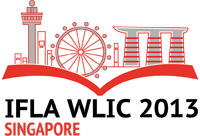General Guidelines for Authors of Papers
Professional units of IFLA are calling for papers for the IFLA General Conference. We have prepared these Guidelines to help those intending to present a paper.
All papers should reflect the conference theme:
Future Libraries: Infinite Possibilities
This theme, chosen for the World Library and Information Congress in Singapore, complements the Presidential Theme of IFLA President, Ingrid Parent: Libraries – A force for change.
In writing a paper, please remember the following:
- Proposals for papers need to be submitted to the IFLA Section or other professional unit for selection and/or approval by the date announced in the relevant call for papers.
- Authors of approved papers are required to send the full text of their papers, including an abstract, to the relevant session coordinator by the date given.
- Early submission of papers is encouraged to ensure that formatting is correct and the paper can be made available online.
-
A conference paper consists of:
- Title of the paper;
- Name(s) of author(s), their Institution, city and country;
- Abstract of approximately 100-300 words, summarizing the paper;
- Full text of between 2000-4000 words.
- The conference paper should be formatted using the style and fonts in the Conference Paper Template and should be in Word-compatible format (.doc or .rtf)
- Please avoid using unexplained acronyms, sets of initials, jargon and phrases which an international audience may not understand.
- Papers may be written in any of the official IFLA languages (Arabic, Chinese, English, French, German, Russian and Spanish).
- Papers will be uploaded to the IFLA website before the conference (usually in June or July).
- Authors of IFLA World Library and Information Congress papers are asked to sign an Author Form which grants a Creative Commons Attribution 3.0 (Unported) (CC-BY 3.0) License to their paper. This allows IFLA to make a copy of your paper available on the website, and also means your paper can be published by a commercial publisher. You will always be named as the Author.
Presentation of the paper
- To present the paper at the conference, you should prepare a talk or slide presentation that follows the theme of your paper. The paper and presentation do not need to be (and should not be) identical, but should be complementary.
- Presentations may be made in any of the official IFLA languages (Arabic, Chinese, English, French, German, Russian and Spanish).
- If you know that your presentation will be interpreted (into other IFLA languages) during your presentation, try to keep the text simple and be aware that interpreters may have difficulty interpreting charts or images.
- Always speak slowly and very clearly so that you are understood by the audience. Please remember that the language you are speaking is not necessarily the mother tongue of the majority of the audience members.
- Speakers must upload any presentation files to the conference network before the session starts. The file will then be available to present from the computer in the session room. Further instructions concerning this will be distributed to session coordinators nearer the time.
Translations and simultaneous interpretation
- Session coordinators will attempt to have translations of papers made into the other official IFLA languages (Arabic, Chinese, English, French, German, Russian and Spanish) whenever possible before the conference.
- Translated papers are also official conference papers and should be formatted using the Translated Paper Template. They will also be made available on the IFLA website.
- These translations are important because not all conference sessions will have simultaneous interpretation; these translations (with abstracts) are therefore very important for many conference participants to get a sense of the presentation topic.
- Interpretation is available in some rooms at the conference so please ensure your session organizers are aware in plenty of time if you plan to present in a language other than English.
Attending the World Library and Information Congress
- It is a long-established policy of IFLA that speakers are responsible for all the expenses involved in attending the conference. However, limited funds may be available to cover the day registration fees (but not other expenses) of speakers from other disciplines who would normally not attend an IFLA conference. Contact your session coordinator to find out more.
- Speakers should register to attend the conference using the normal online registration form and should arrange their own travel and accommodation.
- Registration means that you can attend other sessions at the conference. See the full programme as it develops online to see what else is happening.
Please contact the Section who sponsors your session for more information or assistance.
Last update: 13 September 2013
---




